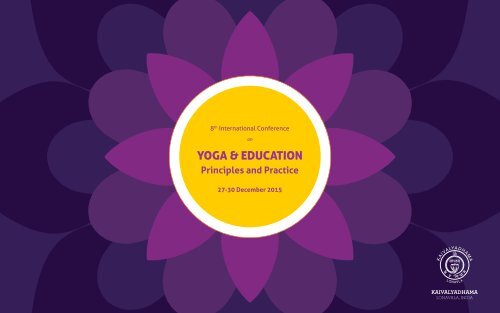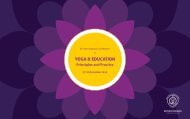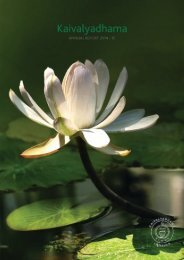8th-conf-brochure
- No tags were found...
Create successful ePaper yourself
Turn your PDF publications into a flip-book with our unique Google optimized e-Paper software.
8 th International Conference<br />
on<br />
YOGA & EDUCATION<br />
Principles and Practice<br />
27-30 December 2015<br />
KAIVALYADHAMA<br />
LONAVALA, INDIA
Why a <strong>conf</strong>erence on Yoga & Education?<br />
Kaivalyadhama has chosen to organize its <strong>8th</strong> International Conference on “Yoga & Education: Principles and Practice”<br />
as we recognize the profound influence that yoga can have in the field of education. The literal translation of yoga means<br />
“integration” or “union”. We at Kaivalyadhama have come to see yoga as the science which aims to harmonize or unite<br />
virtually all aspects of life – the physical, mental, social and spiritual. The most direct and abiding way to achieve this is to<br />
integrate yoga into educational systems.<br />
Our ultimate goal is to see yoga as an inherent part of every curriculum all over the world. We believe that such “integration”<br />
would result in populations of students who are more empathetic, self <strong>conf</strong>ident and mindful of themselves and one<br />
another. The anecdotal and empirical evidence is that schools, which incorporate yoga into their curricula, find that the<br />
learning process is enhanced through reduced level of stress, improved focus and increased attention span. In many parts<br />
of the world schools have found that integrating yoga into the classroom has had these profound and abiding effects.<br />
However, we find ourselves at a point where yoga is not an integral part of a significant number of educational curricula.<br />
More to the point, it could not even realistically be seen as part of a serious agenda on educational reform. Our task is therefore<br />
a daunting and formidable one.<br />
Therefore, we choose to come together here in Lonavala, India not only to share our successes but also to search for a practical<br />
and realistic means by which we can put yoga onto the agendas of educators everywhere. This is indeed a lofty goal.<br />
However, we feel that the time is right to use existing research and empirical evidence to convince decision makers of the<br />
merits of our cause. It is also high time for us – the teachers and practitioners of yoga - to investigate what roadblocks have<br />
impeded our progress towards this goal and find practicle ways to overcome these. Surely the first step towards this goal<br />
is for the international yogic community to come together in unity of purpose and clarity of voice to put forth our case.<br />
Through our common understanding and dedication to yoga – and true to the original meaning of the word – may we seize<br />
an opportunity to find this unity and clarity through this gathering here in Lonavala!
Swami Kuvalayananda (1883-1966)<br />
KAIVALYADHAMA<br />
LONAVALA, INDIA<br />
Swami Kuvalayananda, the undisputed pioneer of scientific research in yoga, had envisioned yoga as the most effective tool<br />
for social renaissance & evolution of human consciousness. In his words, “A propagation of yoga after due research in it<br />
goes a long way in bringing about a healthy rapprochement between science and spirituality, thereby helping mankind to<br />
lead a truly regenerative life.”<br />
The worldwide awareness of yoga, evident today, warrants a deeper understanding of its basic principles, pertaining to its<br />
very nature & practice.
Programme<br />
The inauguration of the <strong>conf</strong>erence will take place on 27 th December 2015 in the afternoon.<br />
Full day sessions will be held on the 28 th , 29 th and 30 th December 2015.<br />
Objectives of the Conference<br />
THE CONFERENCE<br />
1. To provide an international forum to explore ways in which yoga can be incorporated into and<br />
enhance educational practices.<br />
2. To provide a platform for sharing and stimulating innovative and multidisciplinary research<br />
on yoga in education.<br />
3. To provide a platform for discussion and exchange of best policies and practices (including the<br />
experiential aspects) in implementing yoga into educational systems throughout the world.<br />
Collaborators<br />
The <strong>conf</strong>erence is being supported by the Indian Yoga Association and the Council of Yoga<br />
Accreditation – International.<br />
YOGA & EDUCATION: PRINCIPLES AND PRACTICE<br />
8 th International Conference • 27-30 December 2015
A. Yoga in Schools<br />
CONFERENCE THEMES<br />
B. Yoga in Higher Learning Institutions<br />
C. Policies & Leadership Related to Yoga in Education<br />
D. Experiential Paradigm of Yoga in Education<br />
YOGA & EDUCATION: PRINCIPLES AND PRACTICE<br />
8 th International Conference • 27-30 December 2015
A. Yoga in Schools<br />
1. Basic principles of yoga in relation to the fundamental principles of contemporary education;<br />
yoga as a way of teaching ‘mindfulness’; other ways to integrate yoga for enhancing educational<br />
practices<br />
2. Value-based education through yoga, character building and personality development through<br />
CONFERENCE THEMES<br />
yogic attitudes, educator’s creativity in simplifying concepts related to yogic values and attitudes<br />
through fun and joyful activities<br />
3. Yoga protocols for school students who are gifted, normal, differently-abled, physically disabled,<br />
intellectually disabled, and who have learning disabilities and developmental disorders,<br />
the trade-off between standardizing and customizing such protocols, practical difficulties faced<br />
during implementation and possible solutions<br />
4. Yogic principles pertaining to counselling, managing stress, interpersonal and intrapersonal<br />
emotion management, and psychological problems of students and their educators, complete<br />
body-mind training for all-round well-being and actualization of the potentials of students and<br />
their educators through yoga<br />
5. Experiences of applying yogic practices in special schools for juvenile delinquents, community<br />
education centres for street children/adolescents, etc.<br />
YOGA & EDUCATION: PRINCIPLES AND PRACTICE<br />
8 th International Conference • 27-30 December 2015
B. Yoga in Higher Learning Institutions<br />
1. Yoga training<br />
All relevant topics as mentioned for the above section on schools<br />
2. Yoga research<br />
CONFERENCE THEMES<br />
Philosophico-Literary & Scientific research on yoga in education (detailed on the following pages):<br />
i. Philosophico-Literary research<br />
ii. Scientific research<br />
B. Yoga in Higher Learning Institutions - 1/3<br />
YOGA & EDUCATION: PRINCIPLES AND PRACTICE<br />
8 th International Conference • 27-30 December 2015
i. Philosophico-Literary research<br />
1. Research related to ancient texts indicating broad educational practices for transmission of<br />
yogic techniques in ancient India.<br />
CONFERENCE THEMES<br />
2. The evolution of yoga education in ancient India as inferred from ancient manuscripts, historic<br />
surveys, archaeological records, anthropological/ sociological/cultural works.<br />
3. Principles/accounts of yoga in education as obtainable from authoritative ancient treatises<br />
and texts of yoga, commentaries of yogic texts, critical editions of commentaries of yogic texts,<br />
living traditions of yoga, different schools of yoga.<br />
4. Principles/accounts related to yoga in education as obtainable from the Bhagwat Gita, Shrimat<br />
Bhagwat, Patanjala Yoga Sutras, the Vedas, the Upanishads, the Brahmanas, the Puranas, etc.<br />
B. Yoga in Higher Learning Institutions - 2/3<br />
YOGA & EDUCATION: PRINCIPLES AND PRACTICE<br />
8 th International Conference • 27-30 December 2015
ii. Scientific research<br />
Surveys representing current statistics on access to yoga training by students and educators in<br />
the educational sector, attitudes and motivation of the Management of various government and<br />
private educational settings to yoga and yoga training:<br />
CONFERENCE THEMES<br />
1. Research on currently conducted yoga training practices for all types of students mentioned<br />
above and their educators in all types of educational settings ranging from schools to universities<br />
to research institutes - case studies as well as experimental research, research on improvement<br />
in yoga training in educational settings through incorporating the suggestions from earlier<br />
research findings.<br />
2. Research on the attitudes of parents of students to yoga and yoga training, research on motivational<br />
aspects available to students in learning and imbibing yogic knowledge and practices.<br />
3. Research on efforts taken by yoga teachers in educational settings for deepening their insights<br />
and practice.<br />
4. Fundamental research related to the psycho-physiological, bio-chemical, and neuro-psychological<br />
implications of yogic practices on the educational development of students.<br />
B. Yoga in Higher Learning Institutions - 3/3<br />
YOGA & EDUCATION: PRINCIPLES AND PRACTICE<br />
8 th International Conference • 27-30 December 2015
C. Policies & Leadership Related to Yoga in Education<br />
Policies<br />
Formulation of effective policies, as well as, research on current national and international policies<br />
relevant to yoga in education; suggestions for policy revamping.<br />
CONFERENCE THEMES<br />
Leadership<br />
Best leadership practices and strategies related to yoga worldwide.<br />
YOGA & EDUCATION: PRINCIPLES AND PRACTICE<br />
8 th International Conference • 27-30 December 2015
D. Experiential Paradigm of Yoga in Education<br />
1. Contributions of earlier Gurus, stalwarts and eminent personalities all across the world (e.g.<br />
Swami Kuvalayananda) to impart knowledge of yoga as well as lead the younger generation by<br />
example.<br />
2. Exploration of the multi-levels of self-awareness achieved through yoga, and efforts taken by<br />
CONFERENCE THEMES<br />
contemporary practitioners, educators and institutions to keep this experiential paradigm alive<br />
in pedagogy.<br />
YOGA & EDUCATION: PRINCIPLES AND PRACTICE<br />
8 th International Conference • 27-30 December 2015
1. Plenary Session<br />
Addresses by eminent scholars<br />
2. Poster & Paper presentation sessions<br />
Oral presentations and exhibits of research on yoga in education<br />
CONFERENCE SESSIONS<br />
3. Panel discussions<br />
Dialogues amongst panelists to chart the way ahead<br />
4. Question & Answer session<br />
An open interactive session with a scholarly panel<br />
5. Practice sessions / Spiritual Discourses<br />
Different schools of yoga holding practical yoga sessions and/or enlightening talks<br />
6. Cultural Programmes<br />
Musical spiritual evenings that take one toward a blissful state of being<br />
YOGA & EDUCATION: PRINCIPLES AND PRACTICE<br />
8 th International Conference • 27-30 December 2015
Guidelines for Paper Presentations<br />
Soft copies of the abstract (up to 250 words) and full-texts of papers (up to 3000 words) need to be emailed<br />
to kdham<strong>conf</strong>erence@gmail.com. Participants need to follow American Psychological Association (APA)<br />
style for References. More information can be found at http://www.ym-kdham.in/contributors.asp.<br />
Papers may also be submitted in Hindi for which the Siddhanta font available for free download from<br />
www.svayambhava.org can be used.<br />
CALL FOR PAPERS<br />
Guidelines for Poster Presentations<br />
Format: 250-word Abstract, Introduction, Method & Materials, Results, Tables & Figures, and Conclusions.<br />
Full Poster Size: 3’ x 4’<br />
Border: 1/2 inch<br />
Poster Text size: Title - 80 pt., Sub-title – 72 pt. with author name(s), designation(s) department(s), Body<br />
text – 22-25 pt. Any clearly readable font can be used.<br />
Medium of Language<br />
The proceedings of the <strong>conf</strong>erence will be conducted mainly in English, with a certain number of presentations<br />
in Hindi. If there are a sufficient number of papers in other foreign languages like Japanese, Chinese,<br />
French, Italian, German or Spanish, separate sessions for the respective languages could be arranged.<br />
YOGA & EDUCATION: PRINCIPLES AND PRACTICE<br />
8 th International Conference • 27-30 December 2015
Registration<br />
Registrations can be done either online at www.kdham.com or with the help of the provided printed form.<br />
Registration fees are given in the table below. Registration will be <strong>conf</strong>irmed after the payment of the<br />
registration fee. Special group discounts for more than ten people are available.<br />
*For students<br />
A certificate from the Head of the Department/Institute stating that they are a bona fide student of their<br />
REGISTRATIONS<br />
educational institution is mandatory. A student’s concession is also available for past and present students<br />
of Kaivalyadhama. Kaivalyadhama alumni need to enclose a copy of their past course certificate.<br />
*Senior citizens<br />
Senior citizens above 65 years of age (other than self-employed) can avail 20% discount on delegate<br />
fees by enclosing a copy of any valid government document as age-proof. There will be no senior citizen<br />
discount for spot registrations.<br />
*In case required documents are not enclosed, participants will be registered as a regular delegate and<br />
fees will be charged accordingly.<br />
YOGA & EDUCATION: PRINCIPLES AND PRACTICE<br />
8 th International Conference • 27-30 December 2015
Registration Entitlements<br />
1. Registration kit; invitations to the inauguration, valedictory, and cultural programmes<br />
2. Access to all <strong>conf</strong>erence sessions and morning yoga-practice sessions<br />
3. Dormitory/Shared accommodation in the campus<br />
4. Vegetarian breakfast, lunch, dinner, and afternoon tea on all <strong>conf</strong>erence days<br />
Note: Although we will try, kits cannot be assured for spot registrations.<br />
REGISTRATIONS<br />
Registration Fees<br />
INDIAN NATIONALS<br />
CATEGORY Early bird discount Regular Spot registrations<br />
Delegates INR 3,500 INR 4,000 INR 5,000<br />
Students INR 2,500 INR 3,000 INR 5,000<br />
FOREIGN NATIONALS<br />
Delegates USD 300 USD 350 USD 450<br />
Students USD 250 USD 300 USD 450<br />
YOGA & EDUCATION: PRINCIPLES AND PRACTICE<br />
8 th International Conference • 27-30 December 2015
Modes of Payment<br />
Following are the available modes of payment:<br />
1. Cheques*/Demand Drafts drawn in favour of “K.S.M.Y.M. Samiti” payable at Lonavala.<br />
*Note: Only at par cheques will be accepted. Extra bank charges will apply for bank cheques other than<br />
Bank of Baroda, HDFC, ICICI, Canara, Syndicate, SBI and Central Bank of India as they will be considered<br />
as out-station cheques.<br />
PAYMENTS &<br />
CANCELLATION<br />
2. Electronic bank transfer:<br />
Name of Bank – Bank of Baroda, Lonavala branch<br />
Account Number – 09440100006098<br />
Name of Account – K.S.M.Y.M. Samiti<br />
IFSC code: BARB0LONAVA<br />
Swift Code: BARBINBBPCB<br />
Cancellation and refunds (minus applicable bank charges)<br />
Cancellations before Oct 30, 2015 - 100% refund<br />
Cancellations between Oct 30 and Nov 30, 2015 - 75% refund<br />
Cancellations after Nov 30, 2015 - No refund<br />
YOGA & EDUCATION: PRINCIPLES AND PRACTICE<br />
8 th International Conference • 27-30 December 2015
Important Dates<br />
1<br />
AUG<br />
Last date for early registration discount<br />
DATES TO REMEMBER<br />
30<br />
NOV<br />
1<br />
AUG<br />
Last date for regular registration<br />
Last date for submission of abstracts<br />
31<br />
OCT<br />
Last date for submission of full-text of accepted abstracts<br />
YOGA & EDUCATION: PRINCIPLES AND PRACTICE<br />
8 th International Conference • 27-30 December 2015
Private accommodation<br />
At the time of registration, if you so wish, you may request Kaivalyadhama to facilitate booking private<br />
accommodation (if not availing dormitory/shared accommodation included in the registration fee) in local<br />
hotels. Pick-up and drop facility will be provided by Kaivalyadhama in such a case. Contacts and other<br />
details of hotels will be available on an email request made to kdham<strong>conf</strong>erence@gmail.com. Please<br />
note that the total room charges will need to be paid in advance to the hotel as it is holiday season. Also,<br />
individual hotel’s cancellation and extension policies will apply.<br />
ACCOMMODATION &<br />
SURROUNDINGS<br />
Lonavala City<br />
Lonavala is a scenic hill station on the edge of the Eastern Ghats in Pune, Maharashtra, India. It received<br />
its name from the numerous Buddhist caves in the region. (In Prakrit, ‘Len’ means “resting place carved<br />
in stone” and ‘Avali’ means “series.”)<br />
In its history, Lonavala has been part of the Yadava, Mughal, Maratha and Peshwa Empires and is, therefore,<br />
surrounded by numerous forts. In 1871, Lord Elphinstone, who was the local British Governor at the<br />
time, was the first to establish Lonavala and nearby Khandala as hill stations for respite from the heat.<br />
They continue to play a similar role even today.<br />
YOGA & EDUCATION: PRINCIPLES AND PRACTICE<br />
8 th International Conference • 27-30 December 2015
Organizing Committee<br />
Patrons: Swami Maheshananda, Shri. O. P. Tiwari • Chairman: Justice (Retd.) Shri. B. N. Srikrishna • Organizing Secretary: Shri. Subodh Tiwari<br />
Kaivalyadhama Yoga Institute, Swami Kuvalyananda Marg, Lonavla-410403, India<br />
www.kdham.com | +91 2114 276001 / 273001 - Ext. 153








